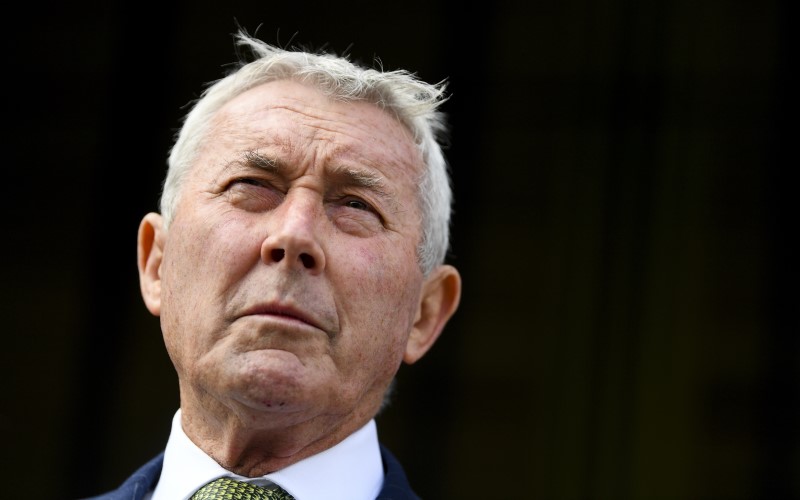The contemptible prosecution of Bernard Collaery is an assault on the rule of law
The Coalition’s vindictive legal campaign reveals its contempt for democratic rights and shows how easily prosecution can slide into persecution.
The criminal prosecution of former ACT attorney-general Bernard Collaery is a perversion of justice.
The Morrison government has spent more than $3 million on conducting a case that should never have been initiated. In pursuing the prosecution, Collaery has been brought to the brink of financial ruin.

The government’s legal strategy and tactics have been contemptible.
In its flagrant disregard of constitutional and legal principle, the government has abandoned its proper role as a model litigant and damaged the rule of law in Australia. In this article, I consider detrimental aspects of the strategy and tactics to make the point more clearly.
First, a brief reminder of how we have got here. It is well known that in 2004, at then foreign minister Alexander Downer’s behest, the Australian Secret Intelligence Service (ASIS) planted surveillance devices in the Palaco Governo, the building that housed the offices of Timor-Leste’s prime minister and the cabinet conference room.
The purpose of this intelligence-gathering enterprise was to listen in to Timor-Leste’s cabinet deliberations concerning a legal dispute with Australia over the location of the maritime boundary between the two nations. The outcome of that dispute would determine the share of rich oil and gas revenues that Timor-Leste and Australia would receive from prospective drilling in the Timor Sea.
Through this secret surveillance activity, the Australian government obtained crucial information on Timor’s case concerning the maritime boundary before the International Court of Justice (ICJ). This provided it with an unfair advantage in the oil and gas argumentation. In the end, to evade the ICJ’s ultimate judgment, the Australian government withdrew from its jurisdiction.
Witness K had been an ASIS officer involved in the surveillance operation. He had been troubled by it. His reservations were magnified when Downer obtained a highly paid consultancy with Woodside Petroleum, the company responsible for exploiting the oil and gas reserves in the Timor Sea.
Witness K lodged a complaint with the Inspector-General of Intelligence and Security concerning the legality of the surveillance. The inspector-general agreed that Witness K could disclose relevant information in any related legal proceedings. Later, information regarding the secret surveillance operation made its way progressively into Australian and Timor-Leste’s media.
In 2013, Timor-Leste sought to re-open proceedings on the maritime boundary issue in the Permanent Court of Arbitration in The Hague. It briefed Collaery to represent its interests. Witness K also briefed him to guard against any legal action that may arise from his decision to give evidence before the court. The Australian government put an immediate end to that. It cancelled his passport to prevent him from leaving the country to provide that evidence. His passport has still not been returned.
In the same year, the Australian Federal Police raided Witness K’s and Collaery’s home and office. At Collaery’s office, it uncovered and took a copy of a detailed legal memorandum containing his advice to Timor-Leste’s government on the maritime boundary. It also obtained a copy of Witness K’s draft affidavit prepared as evidence for the Permanent Court.
Things went quiet for five years. Then, late in 2018, out of the blue and for reasons that are unclear, then attorney-general Christian Porter approved the criminal prosecution of Witness K and Collaery. In essence, the allegation was that they had disclosed classified information on the activities of ASIS, contrary to the Commonwealth Intelligence Services Act. Witness K and Collaery believed, with justification, that they acted in the national interest. They took their case — that the Australian government acted unlawfully by secretly tapping the Timor-Leste cabinet and engaging in contractual fraud — to the Permanent Court of Arbitration.
In 2019, Porter made an application to the ACT Supreme Court for parts of Collaery’s trial to be conducted in secret. A secret trial, of course, constitutes a radical attack on the fundamental principles of open justice and fair trial, constituent elements of the rule of law. Justice David Mossop agreed that most of the trial should not be open to the media or the public.
The principal reason Justice Mossop agreed that large parts of the trial should be held in secret was that if Australia’s “Five Eyes” security partners learnt that sensitive intelligence documents were capable of public disclosure in Australia, the trust of our intelligence allies in the security of their own documentation here may be prejudiced.
Looked at abstractly, this was a persuasive argument. It neglected the fact, however, that the documents at the heart of this case were likely to expose government illegality and, possibly, criminal activity. In that circumstance, our security allies would in all likelihood understand that to keep documents disclosing unlawful government behaviour secret would be contrary to Australia’s national interest.
Collaery appealed against the decision to keep substantial segments of the evidence against him secret, and to close most of the hearing of his trial. He argued that to withhold relevant evidence and conduct a secret trial breached a fundamental principle underlying the rule of law: that criminal proceedings should be conducted openly, transparently and fairly.
The appeal was conducted before the Full Court of the ACT Supreme Court in October this year. The court agreed with Collaery. In a summary of its judgment, it accepted that the public disclosure of information relating to the truth of the matters at issue may involve a risk of prejudice to national security. However, quite rightly, it doubted that a significant risk to security would materialise given that the events in question had occurred 17 years earlier.
Furthermore, the court stated that if relevant evidence could not be publicly disclosed, there was a very real risk that public confidence in the administration of justice could be damaged. The court made clear its opinion that the open conduct of criminal trials was important because it deterred political prosecutions, allowed the public to scrutinise the actions of prosecutors and permitted the public to properly assess the conduct of accused persons.
This was clearly a win for Collaery. But critical matters remain related to the conduct of these criminal proceedings that illustrate how easily prosecution can slide into persecution in the face of an ideologically driven administration bent upon secrecy and deterrence.
In the past three years, the government has taken every conceivable step to delay and extend the proceedings. Almost 50 Supreme Court hearings have had to be held to discuss technical, procedural points of law. A trial date is still not in sight. Every Supreme Court hearing has meant that Collaery has been required to pay substantial legal costs. With every hearing, he has become more indebted.
In the judgment of the Full Court it emerged, for the first time, that the government had held back affidavits of evidence that had not yet been provided either to the primary Justice or to Collaery and his legal team. This was a straightforward denial of procedural fairness. The Full Court remitted these affidavits for consideration by the primary Justice to determine whether they contain matter that the government has argued should remain secret. Given the absence of notice, the government should be required to pay the costs.
In recent days it has been suggested in legal circles that the government is procuring even more affidavits sworn by ASIS staff to bolster its argument that the actions of the defendants damaged the agency’s intelligence-gathering capacities. On this matter ASIS staff would hardly be independent or impartial.
Further, it is legitimate to ask why such affidavits will have been submitted so tardily. One suggestion is that by dropping ever more complex and technical evidence upon the court, together with extrapolated legal arguments, the proceedings will be delayed indefinitely.
If, as is likely, the government claims that the new affidavit evidence should also be secret, a single judge will have to review the new material, while Collaery and his legal team will have no access to it. Another plank of the rule of law will have been fractured to Collaery’s detriment.
Perhaps most remarkably of all, the government has submitted that the written judgment of the Full Court of Supreme Court itself should remain secret. So far Collaery has only the one-page summary. In making that submission, the government appears to neither understand nor appreciate that openness and transparency are significant, constituent elements of the rule of law in Australia.
The Collaery case is, perhaps, the most important case ever brought before the Australian courts concerning the extent and limits of freedom of public and political communication in this country.
 The government’s determination to undermine such fundamental democratic rights is a clear indication that it is willing to act ideologically and illiberally rather in a manner consistent with core principles underlying liberal democracy.
The government’s determination to undermine such fundamental democratic rights is a clear indication that it is willing to act ideologically and illiberally rather in a manner consistent with core principles underlying liberal democracy.
Freedom of the press and whistleblower protections are always the first targets of a repressive state.
- Spencer Zifcak is Allan Myers Professor of Law at the Australian Catholic University, a former President of Liberty Victoria, and a Director of the Accountability Round Table.
